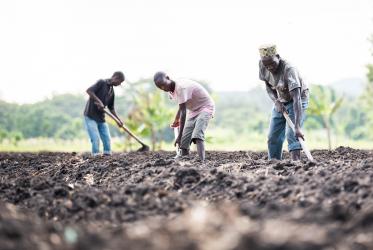In connection with the exhibition, the WCC also hosted a dialogue on “The Protection of Traditional Seeds.” The event offered a unique perspective on evolving landscapes and the significant role of the Rural Women's Assembly in preserving seeds in harmony with the natural world. The exhibit, which runs through 30 October, shares stories of determination, resilience, land struggles, and the vital role that rural women play in upholding the food systems.
As he opened the dialogue event, Dr Manoj Kurian, coordinator of the WCC Ecumenical Advocacy Alliance, reflected that the WCC hosted the exhibition as a sign of the solidarity and support that the global ecumenical movement has for rural women's movements and grassroots communities for access to seeds, food sovereignty, and agro-ecological approaches. “All these ensure that people all over the world can flourish and lead full and fulfilling lives without undermining fellow human beings and by protecting the environment and biodiversity,” said Kurian. “Seeds are at the heart of people's cultures, traditions, identities and food systems.”
Rural women are responsible for 70% of all agriculture and food production, he noted.
“They are at the forefront of protecting the world's future from being consumed and marginalised by industry and human greed,” Kurian said. “Just four agrochemical companies control more than half of the global seed market.”
Mercia Andrew who was the organiser of the exhibit, said: "As the Rural Women's Assembly, our primary focus is to empower women, enabling them to take agency in pursuing their own interests. We aim to address the challenges faced by rural women, such as land access and sovereignty, by making these issues visible through community organization. Building a movement involves bolstering people's confidence and equipping them with the capacity to assert their rights.”
Andrew is a South African who was born in rural areas to a family of farm workers. “I have firsthand experience with the hardships of poverty and the lack of land access,” she said. “This personal connection drives me daily to create a better future, particularly for women.”
She added that she envisions a world that not only achieves gender equality but also redistributes wealth, eradicates poverty, and challenges existing disparities. “This vision seeks to reshape our world into one characterized by harmony between people and nature,” she said. “It's a necessary transformation; otherwise, we risk losing our chance at creating a better world."
Bernd Nilles, director of Fastenaktion, said: "In the quest to safeguard farmers' rights to access, conserve, share, and develop seeds, we must also emphasize the right of farmers to sell seeds. It is unacceptable when governments and businesses attempt to curtail this right. It's not only vital for their survival and the wellbeing of farming families but also strengthens innovation, diversity, and local adaptation."
Nilles expressed appreciation for the recent decision by the Human Rights Council to establish an international monitoring mechanism for the rights of peasants. “This marks a significant step forward, and it's crucial that we continue working diligently to protect farmers' rights and hold governments accountable,” said Nilles.
Lamalefetsa Phakoe of Lesotho passionately articulated, "We serve as protectors of land, sea, love, life, and water, as well as our ecosystem. As women, it's evident that we are the custodians of life, and life necessitates sustenance. To cultivate food, we rely on the combination of land and water. This is why I felt compelled to join this movement; it directly addresses the fundamental requirements for women to thrive in our world.”
Phakoe added that the movement empowers women profoundly. “Prior to my involvement, I possessed knowledge, but through this movement, I've acquired invaluable skills and expertise,” she said. “For example, I hadn't previously engaged in seed-saving, but as a member of this movement, I've developed the ability to preserve seeds after each harvest. We actively encourage the exchange of skills and the sharing of our collective experiences.”








